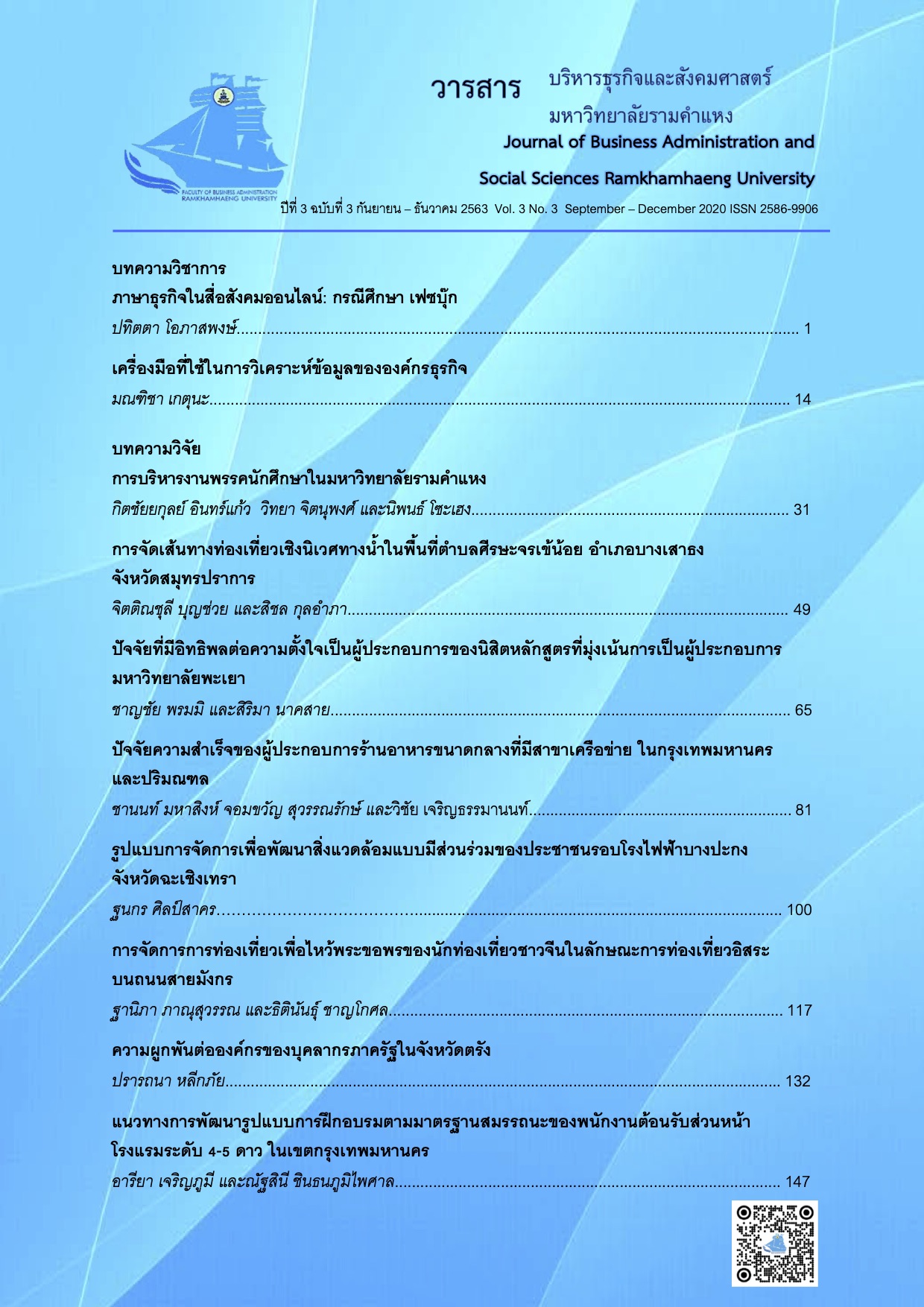Guidelines for the Development of a Training Model Based on the Competency Standards for Guest Service Agents at Four–Five Star Hotels in Bangkok Metropolis
Main Article Content
Abstract
In this research investigation, the researchers examine (1) the level of opinions related to a training model and the need for the competency development of guest service agents at four – five star hotels; investigates (2) the relationship of demographic factors and a training model with the need for competency development; and propose (3) guidelines for the development of a training model based on the competency standards of the service agents under study.
In this mixed-methods research, a questionnaire was used to collect data in the quantitative research using a multistage sampling. Data were analyzed using descriptive statistics and inferential statistics of t test, one-way analysis of variance (ANOVA), and regression analysis on the questionnaire responses of 400 guest service agents at four – five star hotels in Bangkok Metropolis at the statistically significant level of .05. In the qualitative research, in-depth interviews were conducted with seven employees at the level of manager or assistant manager of front offices and in the human resource departments.
Findings are as follows. The sample population strongly agreed with the group and individual training programs. They exhibited the need for competency development overall at the highest level. Demographic factors in the aspects of gender, educational level, operational level, and hotel work experience period exhibited an influence on the need for competency development. Brainstorming the training model, on the job training, and job rotation exhibited an influence on the need for competency development. Public training from specialists would enhance the efficiency of the employees.
Article Details
เนื้อหาและข้อมูลในบทความที่ลงตีพิมพ์ในวารสารบริหารธุรกิจและสังคมศาสตร์ มหาวิทยาลัยรามคำแหง ถือเป็นข้อคิดเห็นและความรับผิดชอบของผู้เขียนบทความโดยตรง ซึ่งกองบรรณาธิการไม่จำเป็นต้องเห็นด้วย หรือร่วมรับผิดชอบใดๆ
บทความ ข้อมูล เนื้อหา รูปภาพ ฯลฯ ที่ได้รับการตีพิมพ์ในวารสารบริหารธุรกิจและสังคมศาสตร์ มหาวิทยาลัยรามคำแหง ถือเป็นลิขสิทธิ์ของวารสารบริหารธุรกิจและสังคมศาสตร์ มหาวิทยาลัยรามคำแหง หากบุคคลหรือหน่วยงานใดต้องการนำบทความทั้งหมดหรือส่วนหนึ่งส่วนใดไปเผยแพร่ต่อ หรือเพื่อกระทำการใดๆ จะต้องได้รับอนุญาตเป็นลายลักษณ์อักษรจากวารสารบริหารธุรกิจและสังคมศาสตร์ มหาวิทยาลัยรามคำแหง ก่อนเท่านั้น
References
กระทรวงการท่องเที่ยวและกีฬา. (2562). สถิติด้านการท่องเที่ยว ปี 2562: (Tourism Statistics 2019). สืบค้นเมื่อ 10 กันยายน 2562, จาก https://www.mots.go.th/more_news_new.php?cid=521
กระทรวงแรงงาน. (2563). มาตรฐานสมรรถนะวิชาชีพด้านการโรงแรม แผนกพนักงานต้อนรับส่วนหน้า (Front Office) ตำแหน่งพนักงานต้อนรับส่วนหน้า (Receptionist). สืบค้นเมื่อ 3 มกราคม 2563, จาก http://www.dsd.go.th/chiangmai/Region/Download_Doc/7255
โกมาตร จึงเสถียรทรัพย์. (2553). 10 ขั้นง่ายๆวิจัยเชิงคุณภาพ (เคล็ดวิชาจากสามัญสู่ขั้นเทพ) (พิมพ์ครั้งที่ 1). นนทบุรี: สำนักวิจัยสังคมและสุขภาพ.
กัลยารัตน์ ธีระธนชัยกุล. (2557). การบริหารทรัพยากรมนุษย์. กรุงเทพมหานคร: ปัญญาชน.
ขจิต กอบเดช. (2559). การบริหารงานส่วนหน้าในสถาบันที่พักแรมต่าง ๆ. กรุงเทพฯ: ซีซีพริ้นติ้ง.
ชุติกาญจน์ ศรีวิบูลย์. (2557). หลักบริหารพัฒนาทรัพยากรมนุษย์. กรุงเทพมหานคร: เพชร.
ชูชัย สมิทธิไกร. (2558). การฝึกอบรมบุคลากรในองค์การ (พิมพ์ครั้งที่ 9). กรุงเทพฯ: จุฬาลงกรณ์มหาวิทยาลัย.
ทีมข่าวเศรษฐกิจ. (2562, 18 กุมภาพันธ์). เปิดรางวัลทั่วโลกมอบให้เมืองไทย. ไทยรัฐออนไลน์. สืบค้นจาก https://www.thairath.co.th/news/business/1498221
นิติพล ภูตะโชติ. (2559). พฤติกรรมองค์การ Organizational behavior (พิมพ์ครั้งที่ 3). กรุงเทพฯ: จุฬาลงกรณ์มหาวิทยาลัย.
ประไพพิมพ์ สุธีวสินนนท์ และประสบชัย พสุนนท์. (2559). กลยุทธ์การเลือกตัวอย่างสำหรับวิจัยเชิงคุณภาพ (Sampling Strategies for Qualitative Research). วารสารปาริชาต มหาวิทยาลัยทักษิณ, 29(2), 31-48.
ประเวศน์ มหารัตน์สกุล. (2558). การจัดการทรัพยากรมนุษย์ : แนวทางใหม่ Human Resource Management A New Approach. กรุงเทพฯ: สำนักพิมพ์ปัญญาชน.
พระราชบัญญัติโรงแรม พ.ศ. 2547. (2547). ราชกิจจานุเบกษา. 125(ตอนที่ 29) ก, 8-12.
พิมพ์ชนก วงษ์เจริญ. (2558). ปัจจัยที่มีอิทธิพลต่อการพัฒนาทรัพยากรมนุษย์เพื่อมุ่งสู่องค์กรแห่งการเรียนรู้ กรณีศึกษา โรงพยาบาลบำรุงราษฎร์. วิทยานิพนธ์บริหารธุรกิจมหาบัณฑิต, มหาวิทยาลัยศิลปากร.
สมคิด บางโม. (2551). เทคนิคการฝึกอบรมและการประชุม (พิมพ์ครั้งที่ 4). กรุงเทพมหานคร: วิทยพัฒน์.
สมาคมโรงแรมไทย. (2563). รายชื่อโรงแรมที่ได้รับการรับรองมาตรฐานที่พักเพื่อการท่องเที่ยว. สืบค้นเมื่อ 2 มกราคม 2563, จาก http://www.thaihotels.org/attachments/view/?attach_id=237270
สิทธิภัท โพธิ์สวย. (2560). รูปแบบการฝึกอบรมและพัฒนาบุคลากรของโรงแรมในรัฐเท็กซัส ประเทศสหรัฐอเมริกา: กรณีศึกษาโรงแรม Marriott Austin ประเทศสหรัฐอเมริกา. การค้นคว้าอิสระบริหารธุรกิจมหาบัณฑิต, วิทยาลัยดุสิตธานี.
สิริภร สุวรรณโชติ. (2559). รูปแบบการพัฒนาผู้บริหารระดับกลางของธุรกิจโรงแรมเพื่อเข้าสู่ประชาคมอาเซียน. ดุษฎีนิพนธ์ปริญญาดุษฎีบัณฑิต, มหาวิทยาลัยบูรพา.
สุธาสินี อัมพิลาศรัย, ณัฐอร มหาทำนุโชค, ชยนันท์ จงเจริญชัยสกุล และประสิทธิ์พร เก่งทอง. (2562). ความต้องการ พัฒนาสมรรถนะการทำงานของพนักงานธุรกิจโรงแรมและรีสอร์ท จังหวัดเพชรบุรี. วารสารวิทยาการจัดการปริทัศน์, 21(2), 145-154. สืบค้นจาก http://msjournals.aru.ac.th/index.php/msjournals/issue/view/16
สุรชัย พรหมพันธุ์. (2554). ชำแหละสมรรถนะเพื่อการพัฒนา.กรุงเทพฯ: ปัญญาชน.
อรรธิกา พังงา. (2553). การจัดการและการปฏิบัติงานส่วนหน้า (พิมพ์ครั้งที่ 2). กรุงเทพมหานคร: โอเดียนสโตร์.
อนุสรณ์ ประยุกตินิวัฒน์, ปภัสสร ผลเพิ่ม, และพัชนีจันทร์น้อย. (2556). ศักยภาพหลักของพนักงานโรงแรมโนโวเทล ท่าอากาศยานสุวรรณภูมิ. วารสารมหาวิทยาลัยนครพนม, 3(2), 78-84. สืบค้นจาก https://so03.tci-thaijo.org/index.php/npuj/article/view/44618
อรุณี ล้อมเศรษฐี. (2554). ปัจจัยที่มีผลต่อการตัดสินใจของนักท่องเที่ยวชาวต่างชาติในการเลือกใช้บริการที่พักในเขตกรุงเทพมหานคร. การค้นคว้าอิสระบริหารธุรกิจมหาบัณฑิต, มหาวิทยาลัยเทคโนโลยีราชมงคลธัญบุรี.
อาภรณ์ ภู่วิทยพันธุ์. (2559). โปรแกรมพัฒนาสมรรถนะด้านบริการจัดการสำหรับผู้นำ. กรุงเทพฯ: เอช อาร์ เซ็นเตอร์.
Boyatzis, R. E. (1982). The competent manager: A model for effective performance. John Wiley & Sons.
Cochran, W. G. (1963). Sampling Techniques New York: John Wiley & Sons.
McClelland, D. C. (1973). Testing for Competence rather than for Intelligence. American Psychologist. 28(1), 1-14.


